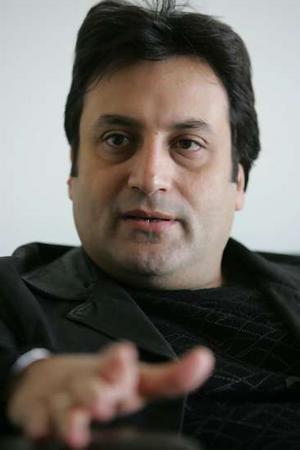 By Ayat Basma BEIRUT, Dec 30 (Reuters) – A year after he predicted a rash of political killings and upheaval, Lebanon’s most famous clairvoyant will not tell a jittery public what 2006 holds when he makes his usual end-year television appearance. Thousands of Lebanese tune in every New Year’s Eve to hear what Michel Hayek foresees, but the 38-year-old said he no longer wanted to be seen as the bearer of bad news.
By Ayat Basma BEIRUT, Dec 30 (Reuters) – A year after he predicted a rash of political killings and upheaval, Lebanon’s most famous clairvoyant will not tell a jittery public what 2006 holds when he makes his usual end-year television appearance. Thousands of Lebanese tune in every New Year’s Eve to hear what Michel Hayek foresees, but the 38-year-old said he no longer wanted to be seen as the bearer of bad news.
"After all the clamour surrounding my 2005 predictions and the rumours that spread later in my name, I have decided not to announce my predictions for this year (2006)," Hayek told Reuters. "What has troubled me most are the rumours. I don’t want to be the reason people are afraid to go to the grocer or send their children to school." A rumour spread by mobile phone text messages and attributed to Hayek predicted mass bombings would tear apart central Beirut earlier this month. So scared were Lebanese, whose nerves have been worn by a string of such attacks, that many shunned Christmas shopping and Sunday strolls to stay home. Hayek denies saying "something weird" would happen downtown that weekend, but many felt his predictions for 2005 had proved so uncannily accurate that any rumour was too scary to ignore.
Hayek predicted last December that "a major incident in downtown Beirut would shake the area for a long time."
In February, a truck bomb killed former Prime Minister Rafik al-Hariri and 22 others on the edge of central Beirut, sparking a wave of protests that paralysed the area for weeks.
Hayek predicted the government would collapse, and it did. He predicted the currency would come under strong pressure but survive, and it did. He predicted the media would come under attack. Two journalists have been assassinated this year and one was badly injured by a bomb in her car.
Among the dead was publisher and lawmaker Gebran Tueni, whom Hayek actually named as a target of violence, along with a cabinet minister and President Emile Lahoud.
Defence Minister Elias al-Murr narrowly survived an assassination attempt in July and Lahoud has been the target of a sustained campaign of political pressure to resign.
ON EDGE
Not all Hayek’s predictions have come true, but enough to make him shun the limelight.
"Michel Hayek’s star predictions transform the heart of Beirut into a desert at high noon," said the front page of Arab newspaper Al-Hayat on Dec. 18, shortly after Tueni’s killing and at the height of the text message prophecies of doom.
It said some businesses in central Beirut had even threatened to sue Hayek for ruining their normally busy weekend.
More than a dozen attacks have rocked Lebanon since Hariri’s killing. Many Lebanese blame Syria, the main powerbroker in Lebanon before it withdrew its troops in April, for the attacks.
"I do not believe anything he says but people are on edge and are susceptible to anything," said housewife Siham Hammoud.
Haitham Khalil, 17, disagrees: "I believe him because all his predictions, or most of them, have happened."
Hayek first found fame in the mid-1980s, when he predicted the destruction of the U.S. Challenger space shuttle. He also foresaw the death of Princess Diana in a 1997 car crash.
He does not offer psychic services to ordinary people but has been predicting the future as a "consultant to firms in the United States, Britain and Australia" for eight years.
"It’s not my fault that these things happen, I do not make them happen, I just see them," he said. "I wish all my predictions did not come true and all those people did not die. Nothing is worth the innocent blood that has been spilled."

admin
 By Ayat Basma BEIRUT, Dec 30 (Reuters) – A year after he predicted a rash of political killings and upheaval, Lebanon’s most famous clairvoyant will not tell a jittery public what 2006 holds when he makes his usual end-year television appearance. Thousands of Lebanese tune in every New Year’s Eve to hear what Michel Hayek foresees, but the 38-year-old said he no longer wanted to be seen as the bearer of bad news.
By Ayat Basma BEIRUT, Dec 30 (Reuters) – A year after he predicted a rash of political killings and upheaval, Lebanon’s most famous clairvoyant will not tell a jittery public what 2006 holds when he makes his usual end-year television appearance. Thousands of Lebanese tune in every New Year’s Eve to hear what Michel Hayek foresees, but the 38-year-old said he no longer wanted to be seen as the bearer of bad news. 


